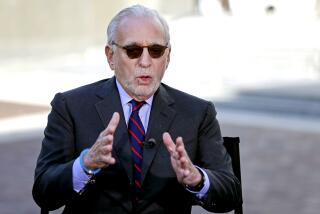Angry Sosnoff Drops Bid for Caesars World : N.Y. Money Manager Says High Cost of Continuing Effort Changed His Mind
- Share via
New York money manager Martin T. Sosnoff threw in the towel Monday, dropping his 3-month-old, billion-dollar tender offer to take over Caesars World, the Los Angeles-based casino owner. The cost of raising the ante, he said, has become too high.
The company’s largest shareholder did not fade away quietly. For one thing, he called upon the company’s management to modify its pending proposals to insulate itself from a future change in control.
Sosnoff also called “erroneous” a federal judge’s recent ruling that knocked the financial pins from his unfriendly offer, while the company proceeds with a recapitalization plan under which it is to pay a $26.25-a-share dividend.
And he attacked the dangers of a New York Stock Exchange practice of allowing trading of “when issued” equity “stubs” that attempt to put a “post-recapitalization” value on a firm’s stock. Sosnoff said that the trading benefits of such “nebulous securities . . . are outweighed by the tremendous potential for manipulation and unfair advantage . . .. “
Not a Corporate Raider
Sosnoff also said he “will not countenance being classed as a corporate raider.” He said he has been a major investor in Caesars World for four years and will continue as an investor, “monitoring” management and working for “true shareholder democracy.”
Meanwhile, Caesars World reset its stockholders’ meeting to July 8 for a vote on its recapitalization, as well as its anti-takeover measures. The modification of a judge’s preliminary injunction permitted it to be reset from July 13. The company did not comment on Sosnoff’s statements.
Sosnoff, who owns 13.7% of Caesars’ outstanding shares, aired a variety of thoughts in a lengthy press release announcing that he has discontinued his $35-a-share tender offer.
He said he was satisfied that all shareholders will receive “substantial value” for their shares when the company’s recapitalization is completed, a result that he takes some credit in accomplishing.
Troubled by Company Proposals
Before his tender offer, he said, management was “unwilling to give favorable consideration” to his earlier suggestion to Chairman Henry Gluck that the company restructure itself in an effort to maximize shareholder value.
Despite the value of the recapitalization plan, Sosnoff said he is “very troubled” by the anti-takeover proposals, which he called corporate governance changes.
The 55-year-old Sosnoff, who writes books on investing and long has been a contributor to financial publications, founded his own firm in 1968 and took it public a year ago. It is named Atalanta/Sosnoff Capital.
Until his Caesars bid, he had a reputation for being an investor who rarely injected himself into the affairs of companies.
All that changed when he went after the casino company, raising his tender twice as the company countered with its own cash payout plan, which it sweetened along the way.
During his campaign, Sosnoff made an unusual--and ultimately futile--proxy campaign to unseat Gluck and three other top officers from the company’s board of directors. His biggest setback, however, came when U.S. District Judge William J. Rea of Los Angeles ruled on June 8 that the financing basis for the tender would violate a Federal Reserve Board margin regulation and issued a preliminary injunction halting the offer.
Sosnoff said Monday that he was disappointed by the ruling. He said he believes that it “lacks any support in the relevant judicial and administrative precedents.”
However, he said, he will not appeal it in view of the termination of his offer.
He said that in pursuing his offer, he has incurred about $30 million in “potential obligations” and that, on an after-tax basis, he has “virtually no financial gain for myself by this effort.”
He added: “While I continue willing to negotiate a friendly transaction at a higher price, on a personal basis, I have reluctantly concluded that the cost of continuing the tender is too high.”
More to Read
Inside the business of entertainment
The Wide Shot brings you news, analysis and insights on everything from streaming wars to production — and what it all means for the future.
You may occasionally receive promotional content from the Los Angeles Times.










